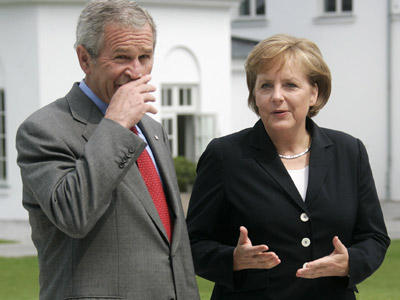
German Chancellor Angela Merkel and US President George W. Bush
address the media after a meeting in Heiligendamm yesterday. Leaders from
the world's major industrialised nations meet in the Baltic resort of
Heiligendamm on June 6-8 for a Group of Eight (G8) summit. (Xinhua/Reuters
Photo)
The summit of the Group of Eight (G8) industrialized nations started
Wednesday evening near the German Baltic resort of Heiligendamm, with German
Chancellor Angela Merkel hosting an informal dinner for the leaders of the
world's major economic powers.
The dinner was held in a 14th-century palace on the Hohen Luckow estate, some
25 km southeast of the summit venue in Heiligendamm.
Most of the leaders arrived in Heiligendamm on Wednesday. U.S. President
George W. Bush flew in Heiligendamm on Tuesday, who is on a European tour.
The three-day G8 summit is expected to focus on climate change, the
development in Africa, the Doha Round of the World Trade Organization, the U.S.
plan of deploying a missile defense shield in Central Europe.
The leaders may also talk about Iran's nuclear program and the security
situation in the Middle East.
The G8 groups Britain, Canada, France, Germany, Italy, Japan, Russia and the
United States.
Besides talks among themselves, the leaders of the world's major economic
powers are scheduled to have two outreach sessions, one with five major
developing countries -- Brazil, China, India, Mexico and South Africa, and the
other with African countries -- Algeria, Ethiopia, Egypt, Ghana, Nigeria,
Senegal and South Africa.
Before the start of the event, Bush was busy with meeting fellow G8 leaders,
including Merkel and Japanese Prime Minister Shinzo Abe, on Wednesday.
Following a meeting with Merkel, Bush told reporters he has a "strong desire"
to work with other world leaders for a post-Kyoto Protocol agreement designed to
tackle climate change, one of the most controversial issues to be discussed at
G8 summit.
"I come with a strong desire to work with you (Merkel) on a post-Kyoto
agreement about how we can achieve major objectives. One, of course, is the
reduction of greenhouse gases. Another is to become more energy independent --
in our case, from crude oil from parts of the world where we've got some
friends, and sometimes we don't have friends," he said.
The United States, the world's biggest greenhouse gas emitter, remains
committed to reduce greenhouse gas and raise energy efficiency, he said.
Merkel said she expected "intensive debate" during the summit on the issue of
climate change.
The United States has been under attacks from Europe and environmental
activists for not having taking stronger measures to tackle climate change.
Germany, which holds the rotating G8 presidency, has called for actions to
limit the rise in global temperatures to two degrees Celsius this century and to
cut carbon emissions by 50 percent below 1990 levels by 2050.
The United States voiced "fundamental opposition" to the German proposal.
Bush has announced a separate plan, calling on 15 of the world's biggest
greenhouse producers to meet and agree on long-term goals by the end of 2008.
The United States, which has refused to ratify Kyoto Protocol, remains
opposed to mandatory targets, citing that environmental protection cannot come
at the price of hurting economic growth.
After their talks in Heiligendamm, Bush and Abe said they agreed that both
countries would work jointly for an effective and flexible framework concerning
the issue of climate change.
"On climate change ...We agreed that Japan and the United States would be
working together for the creation of an effective framework which is flexible,
and that we would be cooperating to achieve that end in the future," Abe told
reporters.
Earlier in the day, European Commission President Jose Manuel Barroso urged
Washington to take stronger measures to tackle climate change.
Europe has yet to see more "contribution" by the United States in the fight
against climate change, Barroso told reporters beforethe start of the G8 summit.
On another contentious issue -- the U.S. plan of deploying a missile defense
shield in Central Europe, Bush tried Wednesday to tone down the tense words of
war between himself and Russian President Vladimir Putin.
Bush said no military response is necessary even after Russia threatened to
retarget Europe if the United States continues with its missile defense plan.
"Russia is not an enemy," Bush told reporters here.
"There needs to be no military response because we're not at war with Russia.
... Russia is not a threat. Nor is the missile defense we're proposing a threat
to Russia," he said.
The United States plans to place a radar system in the Czech Republic and
interceptor missiles in neighboring Poland in the name of defending possible
attacks from Iran.
Russia has accused Washington of raising a new arms race in theregion, which
Washington denies.
Security is extremely tightened around Heiligendamm, but anti-globalization
protests stole the show of the day.
The German government has mobilized more than 16,000 policemen to be
stationed around Heiligendamm in a bid to have a perfect G8 summit. A 12-km
steel fence have been built around the venue.
Nevertheless, some 6,000 anti-globalization protesters evaded police
road-blocks Wednesday morning and approached the fence around the summit venue
in defiance of a police ban.
Later, German police used tear-gas and water cannons to disperse protesters
at the fence, and also off Highway 105 which runs past Heiligendamm at a
distance of about 6 km. Police said they took the actions after being stoned by
some protesters.
One of the protest leaders told German TV Wednesday that a sit-down blockade
around the summit compound would continue until the end of the G8 Summit.



